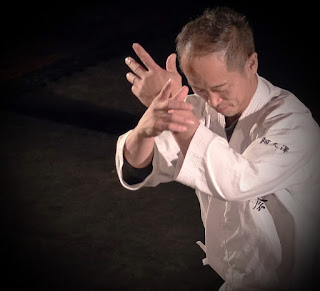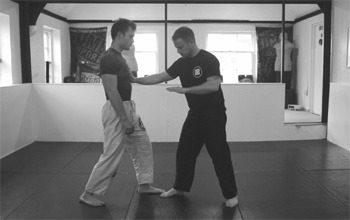Are you obsessional enough?
I have often been accused of being obsessed with practice, my wife sometimes even throwing a desperate look at me, either at home or on the street while I test, more or less discreetly, new things. This obsession, although surprising for my entourage, seems shared by many adepts that I am following on a regular basis.
Taking Robert John and Léo Tamaki as an example, since they come regularly to Hong Kong, meaning I have the opportunity to spend more time with them, I am always amused to see them do Age Te type movements in the street or at a restaurant, or just try new things by touching their glass or the table.
Is it necessary to develop a "compulsive" practice?
On this, the traces left by Sagawa sensei leave little doubt about his commitment, with repetition of Tanren for several hours a day, every day of his life. Astronomical numbers of repetitions even at a very advanced age that most practitioners in the prime of their life wouldn't dream to achieve.
Yokota Kousaku, that I was lucky to interview for Yashima is also an example in this regard. Not only does he practice several hours a day, he also imposes himself challenges each year for his birthday. This year, for his 72th birthday, he performed… 720 kata repetitions! That is about a dozen hours of practice that day. The previous year he did 7,100 push-ups.
These hours of practice are obviously important and matter, but we can only practice so many hours each day, life still having to follow its course. It is nevertheless possible for us to take martial arts practice out of the "official" training time by making every moment an opportunity to train. As I write this article, I am not doing hundreds of mae geri, but I adjust my posture, constantly check the tension in my neck, in my back, I make sure the pressure is balanced between both of my feet and look for removing tension in my shoulders with each key pressed on my keyboard. When I get up, I will make sure not to push unnecessarily into the ground with my feet, not to twist my spine and again not to create tension in my neck. Every moment of everyday life is an opportunity to sit, stand up, walk, grab a drink, open a door. Your daily life is an opportunity to change your operating system. The practice itself is just an opportunity to use this new OS with martial arts and partners.
Visualization is also an essential tool, usable everywhere. Boredom will not exist anymore as you can simply visualize your movements, with or without a partner on the train or when waiting for a friend. Many studies have highlighted the real impact on neural connections during visualization: in other words, you can get results just by visualizing.
Obsession, a characteristic of super performers
A few days ago, I was listening to a great podcast between Tim Ferriss and Peter Attia and I was struck by the fact that both of them are completely obsessed with the activities they undertake. While some are particularly far-fetched (I invite you to listen to the Egg Boxing or Forks and Knives sections), it's exciting to see how their brains are wired and how they approach the activities that matter to them. With total commitment and a desire to understand the subject in its entirety.
And they are no exceptions. I invite you to take a closer look at what people at the highest level in any discipline do and to look at how they approach not only their favorite subject, but also the other activities they engage in. They are likely to become a great source of inspiration.
Taking Robert John and Léo Tamaki as an example, since they come regularly to Hong Kong, meaning I have the opportunity to spend more time with them, I am always amused to see them do Age Te type movements in the street or at a restaurant, or just try new things by touching their glass or the table.
Is it necessary to develop a "compulsive" practice?
 | |||
| Akuzawa Minoru. Photo Aiki-Kohaï |
"My Shisho taught me the things he learnt, but he told me that they would only belong to me when I really acquired them." In bujutsu, it is not enough to reproduce what you are shown, it must become part of you. "
Akuzawa Minoru, Yashima number 2, September 2018
If we can obviously wonder about our mental balance, it is also important not to lose sight of our objective and the immense work required to achieve them. The practice of the greatest adepts is one of a lifetime. Not just 50-60 years going on the mats 2-3 times a week, but a life fully dedicated to practice.
On this, the traces left by Sagawa sensei leave little doubt about his commitment, with repetition of Tanren for several hours a day, every day of his life. Astronomical numbers of repetitions even at a very advanced age that most practitioners in the prime of their life wouldn't dream to achieve.
Yokota Kousaku, that I was lucky to interview for Yashima is also an example in this regard. Not only does he practice several hours a day, he also imposes himself challenges each year for his birthday. This year, for his 72th birthday, he performed… 720 kata repetitions! That is about a dozen hours of practice that day. The previous year he did 7,100 push-ups.
 |
| Yokota Kousaku |
"I practice 50 kata on a regular basis, the 25 of the JKA and 25 of the 150 created by Asai sensei. [...] In addition to kata, I try to keep a Karate body, it means I work on my flexibility, my balance and my stability. Asai sensei defined 150 exercises to develop the body. I have written all of them down and I practice all of them, even if I still have problems with one or two. "
Yokota Kousaku, Yashima number 3, January 2019
These hours of practice are obviously important and matter, but we can only practice so many hours each day, life still having to follow its course. It is nevertheless possible for us to take martial arts practice out of the "official" training time by making every moment an opportunity to train. As I write this article, I am not doing hundreds of mae geri, but I adjust my posture, constantly check the tension in my neck, in my back, I make sure the pressure is balanced between both of my feet and look for removing tension in my shoulders with each key pressed on my keyboard. When I get up, I will make sure not to push unnecessarily into the ground with my feet, not to twist my spine and again not to create tension in my neck. Every moment of everyday life is an opportunity to sit, stand up, walk, grab a drink, open a door. Your daily life is an opportunity to change your operating system. The practice itself is just an opportunity to use this new OS with martial arts and partners.
Visualization is also an essential tool, usable everywhere. Boredom will not exist anymore as you can simply visualize your movements, with or without a partner on the train or when waiting for a friend. Many studies have highlighted the real impact on neural connections during visualization: in other words, you can get results just by visualizing.
Obsession, a characteristic of super performers
A few days ago, I was listening to a great podcast between Tim Ferriss and Peter Attia and I was struck by the fact that both of them are completely obsessed with the activities they undertake. While some are particularly far-fetched (I invite you to listen to the Egg Boxing or Forks and Knives sections), it's exciting to see how their brains are wired and how they approach the activities that matter to them. With total commitment and a desire to understand the subject in its entirety.
And they are no exceptions. I invite you to take a closer look at what people at the highest level in any discipline do and to look at how they approach not only their favorite subject, but also the other activities they engage in. They are likely to become a great source of inspiration.


Commentaires